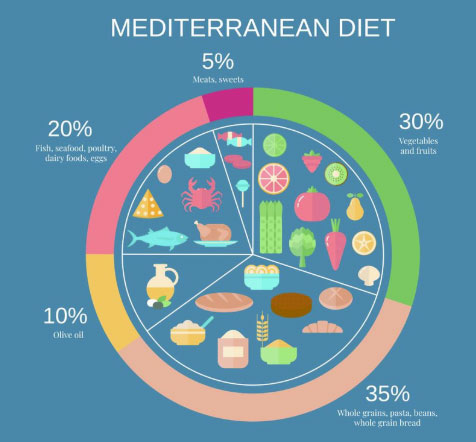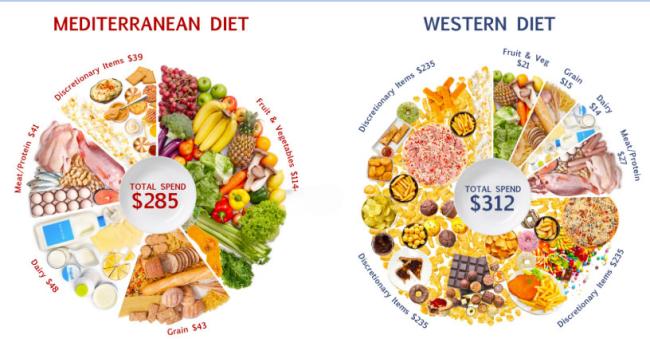
Simple ways to follow the Mediterranean diet
What is the Mediterranean diet?
The term “Mediterranean Diet” refers to the traditional eating habits in countries bordering the Mediterranean Sea.
There is not one standard Mediterranean Diet, but this is a typical breakdown of what it looks like.

What are its benefits?
- Cardiovascular health
- Metabolic health
- Brain health
- Digestive health
- Cancer prevention
- Longevity
- Mental health
Why does it have these benefits?
- Limits saturated and trans fats.
- Encourages healthy unsaturated fats, including omega-3 fatty acids.
- Limits sodium.
- Limits refined carbohydrates and added sugars.
- Emphasizes foods high in fiber.
- Emphasizes foods high in antioxidants.
Why should I try it?
- There are no “rules.”
- It can suit a variety of food preferences.
- It uses an inclusive approach to food (what to eat) instead of an exclusive one (what not to eat).
- Can be implemented using basic cooking skills and kitchen equipment.
- Foods can be obtained at any type of grocery store.
What about food costs?
Mediterranean diet foods
Vegetables
Tomatoes
Cucumber
Broccoli
Cauliflower
Onion
Pepper
Carrots
Green beans
Squash
Eggplant
Potato
Corn
Peas
Lima beans
Fruits
Berries
Apples
Bananas
Oranges
Clementines
Grapefruit
Pears
Cherries
Grapes
Apricots
Figs
Dates
Whole grains
Whole grain bread
Whole grain pasta
Brown or wild rice*
Oats
Popcorn*
Quinoa*
Buckwheat*
Bulgur
Barley
Millet*
Farro
*gluten-free
Nuts, seeds and legumes
Chickpeas
Black beans
Kidney beans
Pinto beans
Lentils (all types)
Peanuts
Walnuts
Almonds
Hazelnuts
Pistachios
Cashews
Pine nuts
Sesame seeds
Mediterranean diet foods
Fish, poultry and meat
Fatty fish with omega-3s:
Salmon
Tuna
Mackerel
Herring
Sardines
Anchovies
Other seafood, as desired
Chicken
Turkey
Beef (less often)
Lamb (less often)
Dairy
Feta
Brie
Cotija
Swiss
Halloumi
Ricotta
Manchego
Cheddar
Parmesan
Plain yogurt
Greek yogurt
Plain kefir
Other foods
Avocado
Olives
Eggs
Olive oil
Avocado oil
Herbs and spices
Parsley
Cilantro
Ginger
Garlic
Mint
Thyme
Dill
Sage
Rosemary
Tarragon
Basil
Oregano
Simple ways to get started
- Swap out refined grains for whole grains.
- Use avocado or hummus instead of mayonnaise.
- Have a meatless meal once a week.
- Snack on nuts or popcorn instead of chips.
- Swap out butter for olive oil.
- Replace salt with herbs and spices.
- Use ground chicken or turkey in place of ground beef.
- Consume one serving of fatty fish per week.
- Start dinner with a leafy green salad.
- Drink mostly water and minimize sugary beverages.
It’s more than a diet
- In addition to nutrition, these lifestyle factors contribute to the benefits of the Mediterranean Diet:
- Meals are enjoyed with family and friends, and the social aspect of food is highly valued.
- Physical activity is viewed as a natural and enjoyable part of daily life, instead of focusing on structured exercise.
- Rest is prioritized, with many Mediterranean countries favoring a short mid-afternoon nap or "siesta," as well as sleeping six to eight hours a night.
- People value spending time together as a way to build strong social bonds.
- Television is typically viewed for less than two hours a day.

